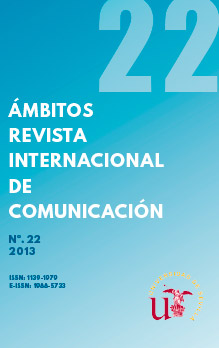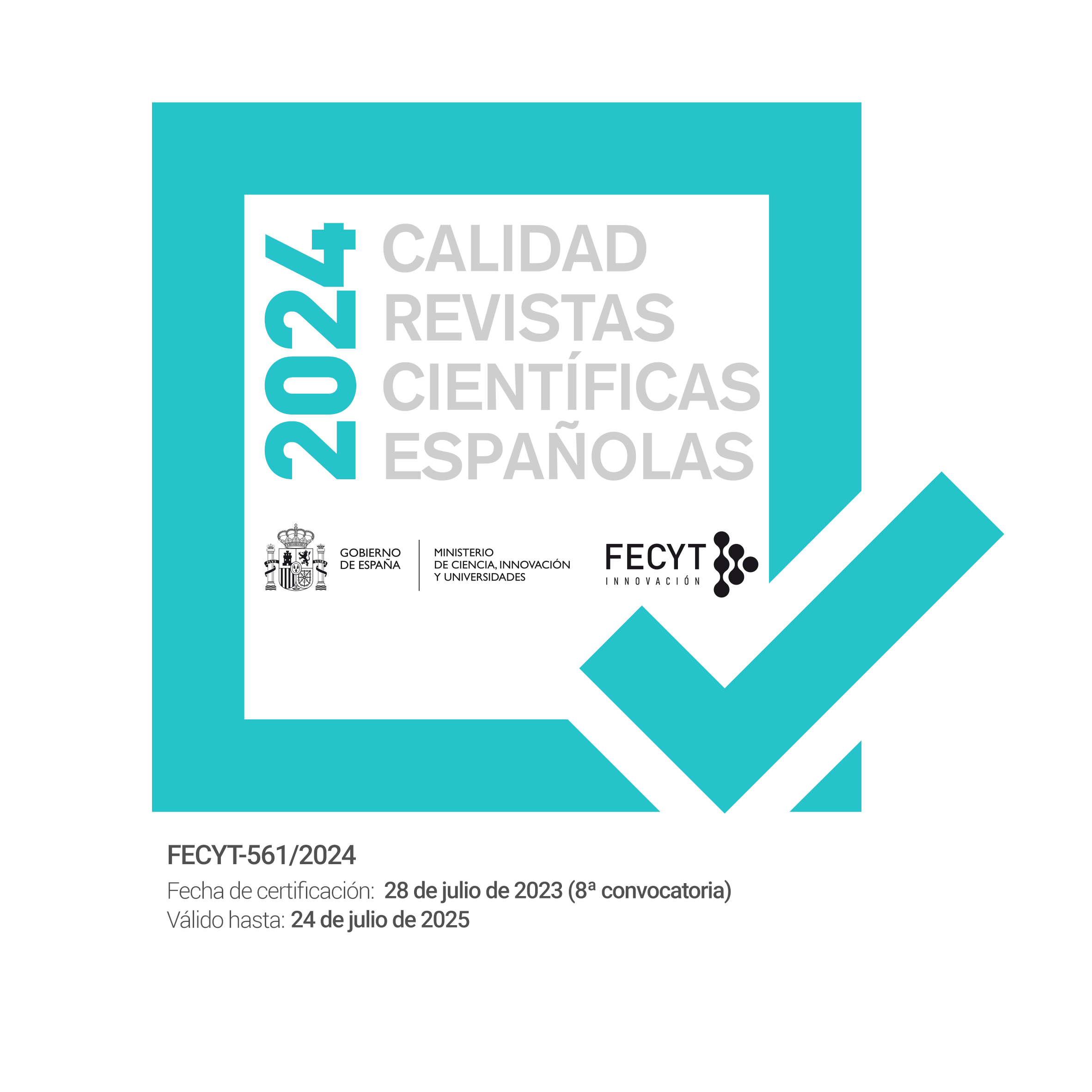El Gran Carnaval de Billy Wilder. Una advertencia sobre las historias de interés humano
Keywords:
Billy Wilder, periodismo, sensacionalismo, interés humano, opinión públicaAbstract
Para ambientar su obra más personal, Billy Wilder escogió una profesión que conocía a la perfección, pues antes de dedicarse al mundo del cine trabajó como reportero en varios diarios de Viena y Berlín. En El gran carnaval, el realizador ejemplifica en el comportamiento del duro Chuck Tatum los peligros de las prácticas sensacionalistas en la profesión periodística –en especial de las denominadas ‘historias de interés humano’– pero, sobre todo, denuncia la fascinación de la opinión pública por la desgracia ajena y el inhumano morbo convertido en una forma más de entretenimiento.
Downloads
Metrics
References
ARMSTRONG, R. (2000): Billy Wilder. American Film Realist. Jefferson: McFarland.
BARNETT, L.: “The Happiest Couple in Hollywood”. Life, vol. 17, nº 24 (1944), pp. 100-112.
BRACKETT, C.: “A Matter of Humor”. The Quarterly of Film Radio and Television, vol. 7, nº 1 (1952), pp. 66–69.
CHANDLER, C. (2002): Nobody’s perfect. Nueva York: Applause.
CIMENT, M. (1988): Billy & Joe. Madrid: Plot.
COLLINS, H. y LEHRBERGER, J. L. (2001): The Life and Death of Floyd Collins. San Luis: Cave Books.
COLPART, G. (1983): Billy Wilder. París: Edilig.
CROWE, C. (2000): Conversaciones con Billy Wilder. Madrid: Alianza Editorial.
DUERFAHRD, L.: What Exposure is the World? The Desert Noir of Ace in the Hole. En McNALLY, K. (ed.)
(2011): Billy Wilder, Movie Maker. Critical Essays on the Films. Jefferson: MacFarland, pp. 11-24.
FINE, G. A. y WHITE, R. D.: “Creating Collective Attention in the Public Domain: Human Interest Narratives and
the Rescue of Floyd Collins”. Social Forces, vol. 81, nº1 (2002), pp. 57-85.
FRENCH, R. B.: Miller, William Burke Skeets. En KLEBER, John E. (ed.) (2001): The Encyclopedia of Louisville.
Lexington: The University Press of Kentucky, p. 622.
GEHMAN, R.: Billy Wilder. A Candid Conversation with the Master of Filmic Seriocomedy (1967). En RANDALL,
Stephen (ed.) (2006): The Playboy Interviews. The Directors. Milwaukie: M Press.
GUBERN, R.: “Billy Wilder. Un pesimista vienés en el Hollywood optimista”. Dirigido por, nº 21 (1975), pp. 1-15.
HANDLIN, J.: “How the Battle Over Ideas Began”. Variety, 18 de noviembre de 2003 [en línea] [Consulta 21
enero 2012]. <http://www.variety.com>
HOYT, E.: “Writer in the Hole: Desny v. Wilder, Copyright Law, and the Battle over Ideas”. Cinema Journal, vol.
, nº 2 (2011), pp. 21-40.
HUGHES, H. M. (1981): News and the Human Interest Story. New Brunswick: Transaction.
JACOBS, J. (1988): Billy Wilder. París: Rivages.
KAPLAN, B.: “Further Remarks on Compensation for Ideas in California”. California Law Review, vol. 46, nº 5
(1958), pp. 699-714.
LALLY, K. (1998): Billy Wilder. Aquí un amigo. Barcelona: Ediciones B.
LUFT, H. G.: “A Matter of Decadence”. The Quarterly of Film Radio and Television, vol. 7, nº 1 (1952), pp. 58–66.
McNALLY, K. (ed.) (2011): Billy Wilder, Movie Maker. Critical Essays on the Films . Jefferson: MacFarland.
MILLER, W. B.: “Our Fight to Save Floyd Collins”. Reader’s Digest, vol. 76, nº 56 (1960), pp. 248-256.
MURRAY, R. K. y BRUCKER Roger W. (1982): Trapped! The Story of Floyd Collins. Lexington: The University
Press of Kentucky.
PEÑA, Simón (2012): Caballeros de la prensa. La imagen del periodismo en el cine de Billy Wilder [Tesis
doctoral]. Leioa: UPV/EHU.
PHILLIPS, G. D. (2010): Some Like It Wilder. The Life and Controversial Films of Billy Wilder. Lexington: The
University Press of Kentucky.
PHILLIPS, G. D.: Billy Wilder (1976). En HORTON, R. (ed.) (2001): Billy Wilder Interviews. Jackson: University
Press of Mississippi, pp. 99-109.
RENTERO, J. C. (1988): Billy Wilder. Madrid: Ediciones JC.
SEIDL, C. (1991): Billy Wilder. Madrid: Cátedra.
SIKOV, E. (2000): Billy Wilder. Vida y época de un cineasta. Barcelona: Tusquets.
SINYARD, N. y TURNER, A. (1979): Journey Down Sunset Boulevard. Ryde: BCW Publishing.
TICHI, C. (1998): Reading country music: steel guitars, opry stars, and honky-tonk bars. Durham: Duke
University Press.
TRAVANCAS, I.: “Jornalista como personagem de cinema”. Anais do 24. Congresso Brasileiro de Ciências da
Comunicação (2001). São Paulo: Intercom.
WARREN, C. N. (1975): Géneros periodísticos informativos. Madrid: ATE.
WILDER, B., SAMUELS, L. y NEWMAN, W. (1950): Ace in the hole [Guión definitivo].
Downloads
Published
How to Cite
Issue
Section
License
Ámbitos. Revista Internacional de Comunicación is an open access journal, which means that all content is freely available at no charge to the user or their institution. Users may read, download, copy, distribute, distribute, print, search or link to the full text of articles, or use them for any other lawful purpose, without seeking prior permission from the publisher or author. This definition of open access is in accordance with the Budapest Open Access Initiative (BOAI).

Unless otherwise noted, all content in the electronic edition is distributed under a "Creative Commons Attribution-NonCommercial-ShareAlike 4.0 International License". You can consult the informative version and legal text of the licence here. This should be expressly stated in this way where necessary.
In case of acceptance of the manuscript, the authors cede the rights of the work for its publication to Ámbitos. Revista Internacional de Comunicación under the Attribution-NonCommercial-ShareAlike 4.0 International license contract (CC BY-NC-SA 4.0). The authors retain copyright and third parties are authorised to copy, distribute and make use of the work, provided they comply with the terms and conditions set out in the licence
- Cite the authorship and the original source of publication (journal, publisher and URL of the work).
- Do not use them for commercial purposes.
- If you remix, transform or create from the material, you must release your contributions under the same license as the original.
More information can be found at https://creativecommons.org/licenses/by-nc-sa/4.0/deed.es
- Abstract 143
- PDF (Español (España)) 141


















